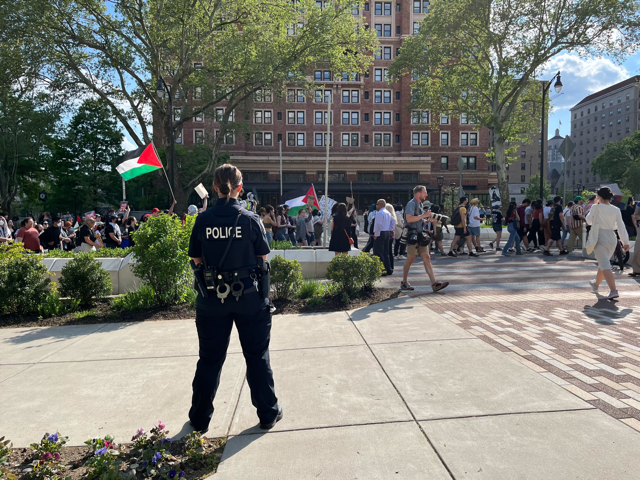In the 2023-2024 school year, the University of Pittsburgh strengthened its unwavering stance in support of our First Amendment right to freedom of speech. They titled the academic year “The Year of Discourse and Dialogue,” hoping to “harness the power of differing views and perceptions to enrich our campus community.”
Our Year of Discourse and Dialogue started with a bang. At the end of the 2023 spring semester, Pitt’s College Republican club invited a known transphobe to campus to speak about and debate the validity of trans people and their right to exist. Michael Knowles, the conservative political pundit and denier in question, is most famously attributed to the quote “Transgenderism must be eradicated.”
What does eradicate mean other than to harm, to exterminate, to kill? Pitt students took to the streets to protest his appearance and support trans identities on campus. Protesters burned a photo of Knowles and protesters — who have since been charged — lit a firework and smoke bomb. Those in attendance chanted in opposition to the debate being held inside the O’Hara Student Center, blaming our university for allowing such a harmful individual on our campus. Brad Polumbo, the individual who debated trans identities with Knowles, who is a conservative in his own right, claimed to have felt unsafe.
I wonder how their debate on whether or not trans people exist and deserve rights made our trans peers on campus feel. Did they feel safe?
When the University was questioned as to why they were allowing a club on campus to invite such a heinous speaker to ridicule the lives of their trans students, Pitt acknowledged that the debate on campus was “toxic and harmful,” but ultimately, there was little they could do.
And thus, we began our Year of Discourse and Dialogue in the wake of a University whose political stance towards freedom of speech was made abundantly clear. They will let people protest just as much as they will let people speak. Or will they?
On Oct. 7 of last year, in response to an attack by the Hamas militant group which killed 1,200 people, Israel turned around and waged war on the people of Palestine, many of whom have little connection to Hamas. In the seven months since Israel’s initial attacks, around 34,535 Palestinians have been killed, with an estimated 10,000 bodies stuck beneath the rubble of buildings no longer left standing.
Protests have erupted in the last seven months all around the world, with many calling for a ceasefire and divestment from Israeli-involved institutions. University students, including our very own, around the US have vehemently protested for Palestine, begging President Joe Biden and their own universities to divest from such institutions.
The University of Columbia, the Ivy League school lauded for its alumni chock full of civil rights leaders, has become one of the frontrunners in student arrests for encampment demonstrations. More than 300 protesters, many of whom were students, were violently arrested, sprayed with pepper spray and mace and held back from treating their injured peers on April 30. In the jail cells holding the demonstrators, many were denied food and water. Their demonstration and the subsequent response by the University and New York Police Department sparked outrage across the country, inspiring encampments at various campuses, including our very own.
While the University of Pittsburgh lags behind these abhorrent numbers, the police presence on campus during our own encampment and subsequent protests and rallies paints a dimly-lit picture of police overreach and peaceful demonstrations turned sour, eerily reminiscent of the Vietnam War days.
Students took to Schenley Plaza the week of April 21 and set up a Gaza solidarity encampment. On the following Sunday, April 28, the day of Pitt’s graduation ceremony, the encampment protesters drew a larger crowd for one final rally. Police responded to handle the growing numbers. Videos of Pitt police officers pushing students and arresting two protesters on the Cathedral Lawn after being shoved can be found on Instagram.
When asked to comment on the incident, University spokesperson Chuck Finder responded that “The University of Pittsburgh affirms the rights of community members to engage in peaceful and orderly demonstrations and works on an ongoing basis to provide continuing education to our community about their rights and responsibilities.”
“Throughout the course of the events in that week, Pitt administrators communicated with demonstrators multiple times about expectations as it related to University policies. While the demonstration was primarily held off-campus at nearby Schenley Plaza, they did move to University of Pittsburgh property for several hours on Sunday, April 28. The situation was closely monitored, and two individuals who did not comply with requests from police officers were arrested,” Finder said.
The administration continues to highlight its commitment to free speech, as was demonstrated in their response to the Michael Knowles debate in Spring 2023. This stance, however, is inconsistent when juxtaposed with its handling of the current student protests advocating for Palestinian rights and freedom. On one hand, Pitt permits inflammatory rhetoric under the guise of free speech, while on the other, it responds with a heavy police presence to peaceful demonstrations. This contradiction raises questions about the true extent of our university’s dedication to fostering a safe and inclusive environment for all students, especially when one considers the violence and behavior police officers exhibited toward students on April 28.
It brings to mind the tragic events of Kent State, where the violent suppression of student protests during the Vietnam War era resulted in the deaths of four students and injuries to nine others. The horrors of police and military intervention in peaceful protests should have taught us invaluable lessons about the importance of protecting the rights of demonstrators and the dangers of excessive force. Yet, it seems history is at risk of repeating itself as universities, under the guise of maintaining order, potentially compromise the safety and rights of their students.
This is the most paramount time to turn to our history books and see the horrors of police and government interference in student protests calling for human rights. We must fight this injustice under the veil that our university allegedly supports freedom of speech. Pitt began our lovely Year of Discourse and Dialogue with Knowles’ footprints still fresh in the sand and ended it with the violent arrests of students calling out Pitt’s direct investment and involvement in the Palestinian genocide. The hypocrisy at our own institution is clear.
Maybe don’t call the police on peaceful protesters fighting for human rights and to end a genocide of a whole people. If our history has taught us anything, it is that police involvement in these matters never ends well, and hypocrisy leaves you on the wrong side of history.
Livia LaMarca is the assistant editor of the opinions desk who misses using the Oxford comma. She mostly writes about American political discourse, US pop culture and social movements. Write to her at [email protected] to share your own opinions!




